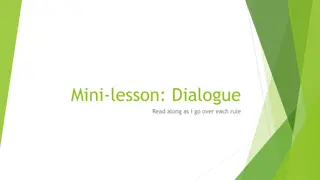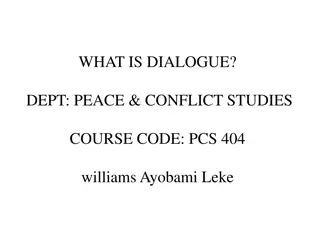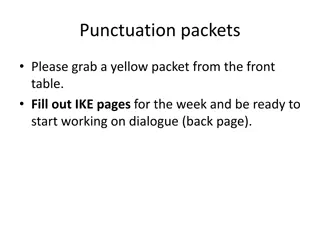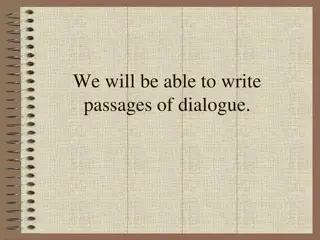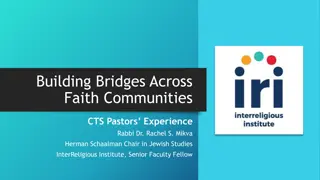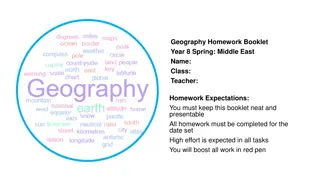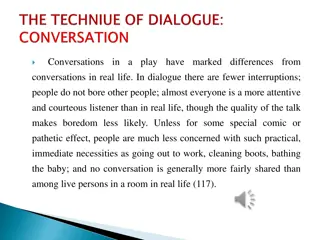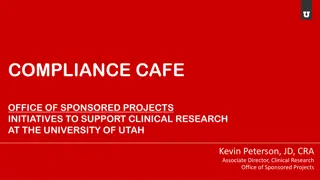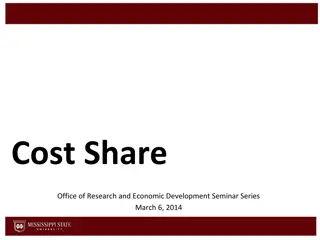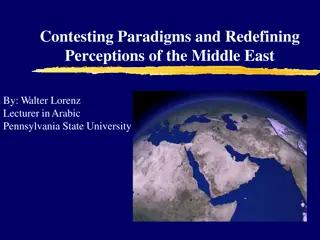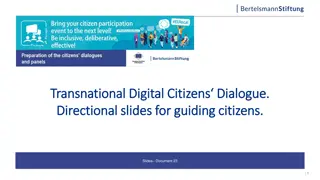State-Sponsored Interreligious Dialogue in the Middle East: A Political Analysis
This research delves into the growth of state-sponsored interreligious dialogue initiatives in the Middle East between 2000-2020. It explores the political significance, impact on relations between political and religious authorities, and implications for religious practices in the region. The thesis argues that these initiatives reflect complex changes in geopolitical power, political ideologies, and religious practices.
Download Presentation

Please find below an Image/Link to download the presentation.
The content on the website is provided AS IS for your information and personal use only. It may not be sold, licensed, or shared on other websites without obtaining consent from the author.If you encounter any issues during the download, it is possible that the publisher has removed the file from their server.
You are allowed to download the files provided on this website for personal or commercial use, subject to the condition that they are used lawfully. All files are the property of their respective owners.
The content on the website is provided AS IS for your information and personal use only. It may not be sold, licensed, or shared on other websites without obtaining consent from the author.
E N D
Presentation Transcript
THE GLOBAL POLITICS OF INTERRELIGIOUS DIALOGUE: RELIGIOUS CHANGE, SOLIDARITY AND CITIZENSHIP Michael Daniel Driessen Associate Professor of Political Science and International Affairs, John Cabot University, Rome IN THE MIDDLE EAST
Pope Francis (Holy See) Grand Imam Ahmed al Tayeb (al Azhar) Crown Prince Mohammed bin Zayed (United Arab Emirates) ABU DHABI HUMAN FRATERNITY DOCUMENT (2019)
RESEARCH QUESTIONS General Research Question: 1) What explains the growth of state-sponsored interreligious dialogue (IRD) initiatives in the Middle East between 2000- 2020? Specific Research Questions: 2) What are the political meaning and consequences of IRD initiatives? 3) How do IRD initiatives impact the relationship between political authority and religious authority in the region? 4) What do IRD initiatives teach us about the way religion is lived and practiced in contemporary societies of the Middle East?
STATE-SPONSORED INTERRELIGIOUS DIALOGUE INITIATIVES IN THE MIDDLE EAST
THESIS The growth of state-sponsored IRD initiatives in the Middle East reflects and advances complex changes in: 1) the balance of geopolitical power 2) political ideas 3) religious practice
ARGUMENT LAYER 1: GEOPOLITICAL POWER States sponsor IRD initiatives as: 1) An International Public Relations Strategy In response to security concerns of Western policy makers and financial investors 2) A Domestic Religious Diversity Management Tool To better govern domestic religious fields Especially with respect to problems of religious pluralism and religiously inspired violence To regulate religious authority and increase legitimacy of the state 3) A result of Geopolitical Competition As an element of regional statecraft and a counterweight to reformist Islamist projects State-sponsored IRD is especially prevalent among: Reformist Islamist governments (Turkey, Iran, Indonesia and Malaysia in the early 2000s) Conservative Monarchies (Jordan and Morocco in the early 2000s, Gulf States today) It is not prevalent among: Secular Nationalist regimes (Algeria, Syria and Iraq)
ARGUMENT LAYER 2: IDEATIONAL CHANGES The growth of IRD initiatives in the Middle East also reflects long-run ideational and theological efforts by a broad spectrum of religious actors to construct successful, sustainable and distinctively Islamic approaches to modernity and democracy Thus, IRD in the Middle East reflects: 1) New ideas about citizenship rights and freedoms 2) New ideas about religious pluralism and interreligious solidarity 3) New ideas about the role of Islam in the state and in the public sphere IRD has facilitated attempts to synthesize the social mobilizational capacities of religion with the protection of individual rights and freedoms and a religiously- identified public sphere
ARGUMENT LAYER 3: RELIGIOUS CHANGE The growth of IRD initiatives in the Middle East also reflects long-run processes of social change linked to modernization in the region including: 1) Individualization of religious beliefs and practices 2) Democratization of political and social choices 3) The disruption of traditional forms of religious authority Especially reflected in post-Islamist Arab Spring political aspirations which combine support for political freedom, citizen rights and public religious values And as formalized in interreligious engagement strategies promoting inclusive citizenship and human fraternity
RESEARCH LITERATURES The Return of Religion in International Relations (Petito, Appleby, Thomas, Huntington, Philpott, Bettizia, Haynes, Cesari, Fox) Islam and Modernity in the Middle East (Mahmood, Deeb, Salvatore, Sachedina, Bayat, Roy, Menchik, Eisenstadt, Fadel, Soroush) Religion, Democracy and Post-Secularism (Stoeckl, Rosati, Habermas, Maritain, Dallmayr, Moyn) Sociology of Religion (Roy, Joas, Taylor, Milbank, Bellah, Berger, Casanova, Turner) History and Theology of Interreligious Dialogue (Abu Nimer, Brodeur, Marshall, Clooney, Moyaert, Coda, Bin Bayyah, Bretherton, Cornille, Swidler, Hick)
AUTHORED PUBLICATIONS ASSOCIATED WITH RESEARCH The Global Politics of Interreligious Dialogue: Religious Change, Citizenship and Solidarity in the Middle East [Manuscript completed and submitted for review] Interreligious Engagement and Political Theory: Between Virtue Ethics and Religious Humanism, in Melanie Barbato (ed.) Interreligious Dialogue and Diplomacy, Special Journal Issue (forthcoming) with Cross Currents Human Fraternity and Inclusive Citizenship: Interreligious Engagement in the Mediterranean Istituto per gli Studi di Politica Internazionale (2021), with Fabio Petito and Fadi Daou Interreligious Mapping of the Middle East: Lebanon, Jordan, Turkey and Iraq, The Adyan Foundation (2020), with Anna Maria Daou, Dima Karadsheh, Neira Omerovic, Faris Ilyas Keti, Nayla Tabbara and Ahmed Nagi. Evaluating Interreligious Dialogue in the Middle East, (2020) Peace Review 32 (1) Good-Faith Arguments: the Value of Keeping KAICIID, Commonweal (2020), 171(2)
DATA COLLECTION 5-years of field research on 4 principal sites of interreligious dialogue in the Middle East: 1) Focolare Community in Algeria (Summer 2017: Oran, Algiers, Tlemcen) 2) Adyan Foundation in Lebanon (Summer 2018: Beirut, Tripoli, Saida) 3) Doha International Center for Interfaith Dialogue (Spring 2018: Doha) 4) King Abdullah bin Abdulaziz International Center for Interreligious and Intercultural Dialogue (Fall 2018: Vienna) Additional field work carried out in Abu Dhabi (UAE), Cairo (Egypt), Amman (Jordan) and Rome (Italy). Research assistants carried out further fieldwork in Iraq and Turkey 150 interviews including 70 interviews with youth participants in Algeria and Lebanon using a 10-question survey instrument) and 70 elite-interviews with interreligious dialogue leaders in the region Systematic review of major interreligious dialogue declarations from 2000-2020 in the Middle East and network analysis created of major religious authorities sponsoring them
Algeria Lebanon Qatar Saudi Arabia Survey and wave Religiosity Religion is very important in life Religion is very important in life (youth aged 18-29) 90.7% 88.5% 52.9% 49.2% 98.9% 88.7% 100% WVS6 (2010-2014) WVS6 (2010-2014) 88.5% RELIGIOUS CHARACTERISTICS OF ALGERIA, LEBANON, QATAR AND SAUDI ARABIA Religion in Public Life Religious practices are private and should be separated from social and political life (agree) Support for Islamic law (agree) Support for democracy (agree) 62.6% 87.8% --- 37.9% AB2 (2011) 68.7% 67.4% 23.2% 81.3% 92.3% --- 73.4% 55.9% AB2 (2011) AB2 (2011) Religious Pluralism Only my religion is the right religion (agree) People who belong to different religions just as moral (agree) Would not want to have religious others as neighbors (agree) Religious minorities have the right to practice their religious ceremonies (agree) 91.6% 45.8% 97.6% --- WVS6 (2010-2014) 33.2% 71.3% 55.9% --- WVS6 (2010-2014) 28.7% 4.8% 11% 45.1% AB2 (2011) 59.6% 91.9% --- 56% AB2 (2011) Religious Demographics Total Muslim population Total Christian population Human Development Index (rank) 98.3% 0.1% 82nd 60.8% 32.5% 93rd 72.8% 91.7% 10.5% 4.4% 41st RCS (2015) RCS (2015) UN Development Program (2018) Freedom House 2018 36th Political Characteristics Democracy Index NF (35) PF (43) NF (24) NF (7)
GOALS OF DIALOGUE ORGANIZATIONS 12 10 8 6 4 2 0 Freedom of Religion Minority Rights Transformative Change (relig or pol) Turkey Inclusive Citizenship Lebanon Jordan Iraq Average
AUDIENCES OF DIALOGUE ORGANIZATIONS 14 12 10 8 6 4 2 0 Global National Local Youth Religious Minorities Women Islamists Conservatives Liberals Lebanon Jordan Turkey Iraq Average
STRATEGIES OF DIALOGUE ORGANIZATIONS Strategies of Action 10 9 8 7 6 5 4 3 2 1 0 Media Capacity Building Advocacy Elite Encounters Turkey Education Iraq Spirituality/Prayer Average Political Change Lebanon Jordan
ELEMENTS OF A POLITICAL THEOLOGY OF DIALOGUE, PLURALISM AND CITIZENSHIP THROUGH IRD IN THE MIDDLE EAST
NOSTRA AETATE DECLARATION (1965) The Catholic Church rejects nothing of what is true and holy in these religions. It has a high regard for their manner of life and conduct, their precepts and doctrines...The Church therefore urges its members to enter with prudence and charity into dialogue and collaboration with members of other religions...preserving and encouraging the moral truths found among non-Christians as well as their social life and culture.
THE AMMAN MESSAGE (2004) The Amman Message amounts to a historical, universal and unanimous religious and political consensus (ijma ) of the Ummah (nation) of Islam in our day, and a consolidation of traditional, orthodox Islam. The significance of this is: (1) that it is the first time in over a thousand years that the Ummah has formally and specifically come to such a pluralistic mutual inter-recognition; and (2) that such a recognition is religiously legally binding on Muslims since the Prophet (may peace and blessings be upon him) said: My Ummah will not agree upon an error (Ibn Majah, Sunan, Kitab al-Fitan, Hadith no.4085). Prince Ghazi bin Muhammad (2012) the way of this great religion that we are honoured to belong to calls us to affiliate with and participate in modern society and to contribute to its elevation and progress, helping one another with every faculty [to achieve] good and to comprehend, desiring justice for all peoples, while faithfully proclaiming the truth of our religion. Amman Message (2004)
A COMMON WORD BETWEEN US AND YOU (2007) Scriptural Rooting: There is no compulsion in religion, (Al-Baqara 2:256) For each We have appointed a law and a way. Had God willed He could have made you one community. But that He may try you by that which He hath given you (He hath made you as ye are). So vie one with another in good works. Unto God ye will all return, and He will then inform you of that wherein ye differ. (Al-Ma idah, 5:48)
MARRAKESH DECLARATION ON THE RIGHTS OF RELIGIOUS MINORITIES IN PREDOMINANTLY MUSLIM COMMUNITIES (2016) NOTING FURTHER that deep reflection upon the various crises facing humanity underscores the inevitable and urgent need for cooperation among all religious groups, we AFFIRM HEREBY that such cooperation must be based on a "Common Word," requiring that such cooperation must go beyond mutual tolerance and respect, to providing full protection for the rights and liberties to all religious groups in a civilized manner that eschews coercion, bias, and arrogance. BASED ON ALL OF THE ABOVE, we hereby: Call upon Muslim scholars and intellectuals around the world to develop a jurisprudence of the concept of "citizenship" which is inclusive of diverse groups. Such jurisprudence shall be rooted in Islamic tradition and principles and mindful of global changes.
HUMAN FRATERNITY DECLARATION (2019) Freedom is a right of every person: each individual enjoys the freedom of belief, thought, expression and action. The pluralism and the diversity of religions, colour, sex, race and language are willed by God in His wisdom, through which He created human beings. This divine wisdom is the source from which the right to freedom of belief and the freedom to be different derives. the concept of citizenship is based on the equality of rights and duties, under which all enjoy justice. It is therefore crucial to establish in our societies the concept of full citizenship and reject the discriminatory use of the term minorities which engenders feelings of isolation and inferiority.
HUMAN FRATERNITY DECLARATION (CONT) This Declaration, believes firmly that among the most important causes of the crises of the modern world are a desensitized human conscience, a distancing from religious values and a prevailing individualism accompanied by materialistic philosophies that deify the human person and introduce worldly and material values in place of supreme and transcendental principles. We affirm also the importance of awakening religious awareness and the need to revive this awareness in the hearts of new generations through sound education and an adherence to moral values and upright religious teachings. In this way we can confront tendencies that are individualistic, selfish, conflicting, and also address radicalism and blind extremism in all its forms and expressions.
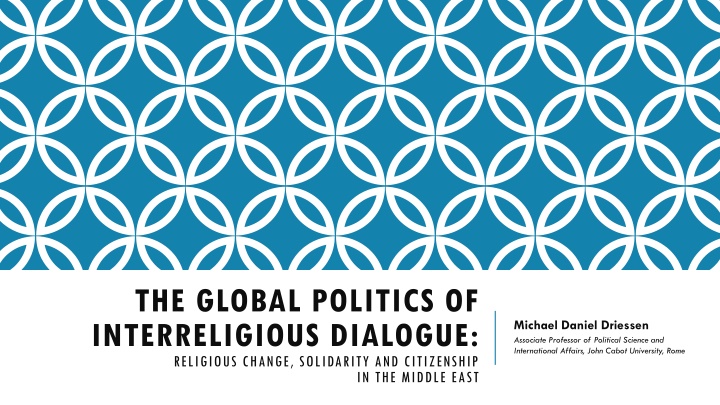


![READ⚡[PDF]✔ Emerging Space Powers: The New Space Programs of Asia, the Middle Ea](/thumb/21554/read-pdf-emerging-space-powers-the-new-space-programs-of-asia-the-middle-ea.jpg)



